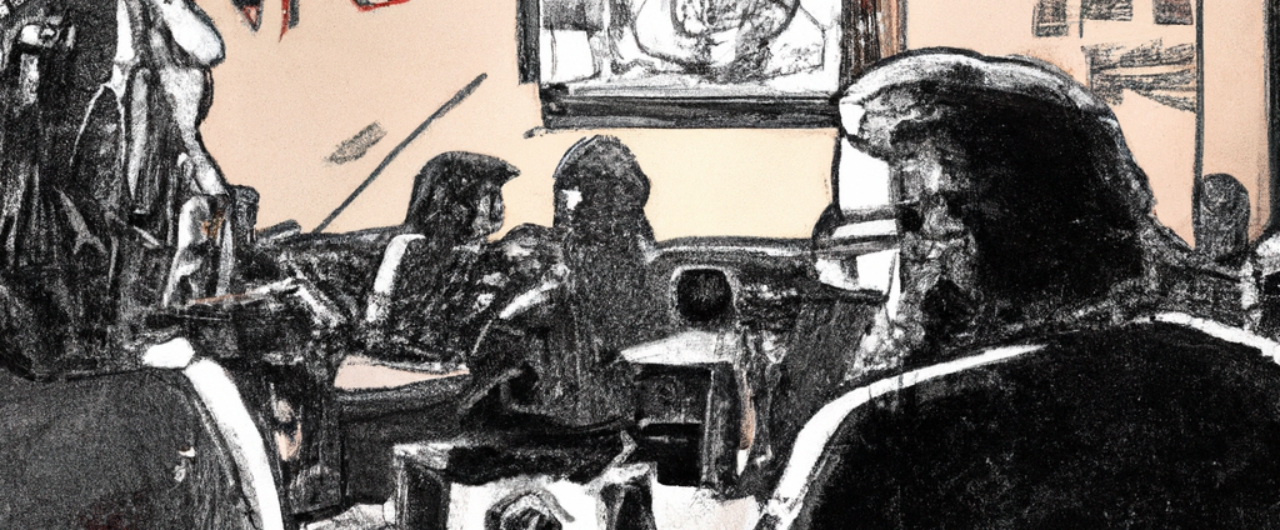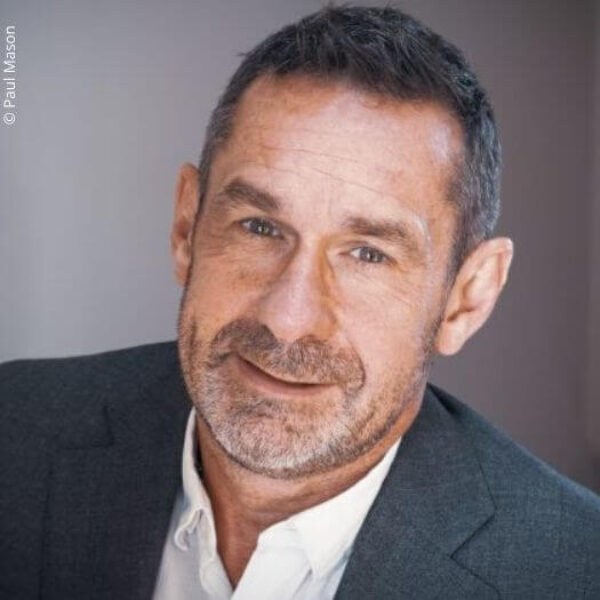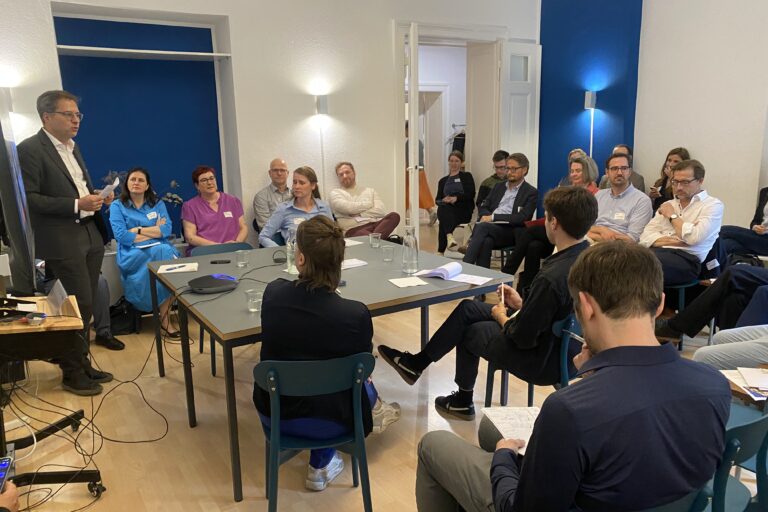On the first day of the Second World War, the poet W. H. Auden winced at the nonchalance of his New York drinking buddies. „Faces along the bar,“ he wrote, „Cling to their average day. The lights must never go out. The music must always play“.Those lines have haunted me ever since I left Kyiv, 36 hours before the bombs dropped.
This is the biggest conventional war in Europe since 1945; it has the potential both to go nuclear and to starve the global south; it has fractured the rules-based global order; it may, yet, plunge Europe into cold and darkness. But for many progressives—both politicians and voters—it has seemed a distraction. Urgent, yes. Important, yes. But to be managed like a distant crisis, compartmentalised into diplomatic and humanitarian projects, while we get on with the „average day“ of social and economic reform.
We need to break from that approach. This is not just a war in Ukraine; it is a war being waged against the collective West, against the very concept of international law and the universality of human rights. Until Putin’s aggression is defeated, the conflict should shape and pervade every aspect of social-democratic, green and radical leftist politics.
And yet, it does not. Across Europe, social-democratic leaders have voted to sanction Russia and provide aid and arms to Ukraine. But they have done so slowly, reluctantly and often openly yearning for a return to „normal“.
The radical left, meanwhile, has split irrevocably. Some, like Li Andersson’s Left Alliance in Finland, have made the necessary rapid mind-shifts; embracing NATO membership and the arming of Ukraine. Others, like Sahra Wagenknecht’s wing of Die Linke in Germany, have disgraced the red flag in the same manner as their predecessors in the Weimar Republic. In between, many dedicated activists stay silent, wishing the problem would disappear.
As for the Green parties, they too have wavered between resolute internationalism, helpless pacifism and what the Syrian writer Leila Al-Shami has called „the anti-imperialism of idiots“.
The immediate electoral results of these divisions and hesitations have been negative. It does not matter that ruling socialist parties in Sweden, Germany, and Spain did the right thing if—in the wider left and progressive political culture—there is a strong aura of reluctance and confusion over the character of Putin’s regime. Our failure to brace ourselves as socialists and resist Putin enthusiastically—while tolerating a Putinist wing of the left as if our disagreements were over some minor issue—will haunt us unless we overcome it.
Forging New Alliances and State-led Solutions
The first act of coalition building for the left must be a dis-alignment with the inheritors of Stalinism. This is hard to do. In Britain, it has meant the complete cleavage of the movement that put Jeremy Corbyn into Labour’s leadership; a schism within Scottish Nationalism; friendships forged through years of economic struggle suddenly broken. But it has to happen. Because, for those who grasp the seriousness of the threat we face, the route to a progressive political majority—and for a new international order based on law, universalism and cooperation—is clear.
Putin has attacked Ukraine now because he knows that, by the 2040s, a Russian economic model based on fossil fuel and corruption cannot endure. His invasion has made decarbonisation—regarded as a luxury, or even with hostility by many on the right—vital for the security of Europe and its nations. For countries like mine, which chose to denude themselves of industrial capacity and intellectual property, he has made state-led industrial strategy compulsory.And by attacking Western civil society throughout the depth of its political, cultural and information systems, Russia has made it essential that we pursue the socialist objectives of democratic resilience and social cohesion with vigour.
Once we understand this, the modernised social-democratic parties and their allies have a clear route to hegemony.
For there is no free-market solution to this crisis, no solution based on narrow nationalism, no solution in the doctrine of the „black zero“.
The moment demands a synthesis of the centre and the left’s objectives: state-led decarbonisation, smart reindustrialisation, mission-based industrial strategy, responsible fiscal expansion, social cohesion and a deepened democracy. To this list, we must add without the slightest reluctance: rearmament.
If we want to deter Putin from spreading his attack beyond Ukraine, we need armies with a decisive technological edge over Russia’s, deeply embedded within the societies they are defending. We need a NATO alliance that lives up to its claims to defend democracy and freedom. If there were any doubt before, these must become social democracy’s explicit goals.
In the mid-1930s, the British Labour leader Clement Attlee, a war veteran, threw aside his own pacifism to demand solidarity with Spain, the rapid rearmament of a country he had called „imperialist“, and an end to its appeasement of Hitler. Attlee led the working class from pacifism to anti-fascism; he isolated and defeated Stalinism; and—even in the depths of the war—he nurtured the design for a post-war United Nations. He remained an idealist in a realist world, and we can learn a lot from the British „Zeitenwende“ he achieved.
The coalition we have to build is not simply composed of parties and trade unions. It will be composed of the diverse demographic and political „tribes“ of modern society. And it must have a geopolitical dimension. Strategic autonomy and technological sovereignty were, for too long, mere buzzwords within European social democracy. Now, with US democracy fragile and America’s attention focused on the rise of China, we need to concretise them.
Time is short – and Putin’s game plan is clear. He intends to trigger large-scale popular opposition to solidarity with Ukraine through a mixture of scare tactics and energy shortages. His proxies—on the far right and, sadly, in parts of the far left—want to turn discontent over inflation into a mass movement to end sanctions and stop the arms supply.
This will not be stopped by appeals to loyalty or bureaucratic suppression. The argument has to be won. The route to economic, social and climate justice in Europe lies through the military defeat of Putin in Ukraine, the moral defeat of his proxies here, and the rapid redistribution of wealth and power downwards.
For us, the danger lies not in the policy space but the mobilisation space.
This winter, the place of social democrats, greens, progressive nationalists, and the radical left is on the streets among the masses, not just in the corridors of parliament.
If we do not lead them and channel their energy and anger into our political space, the bad actors will.





